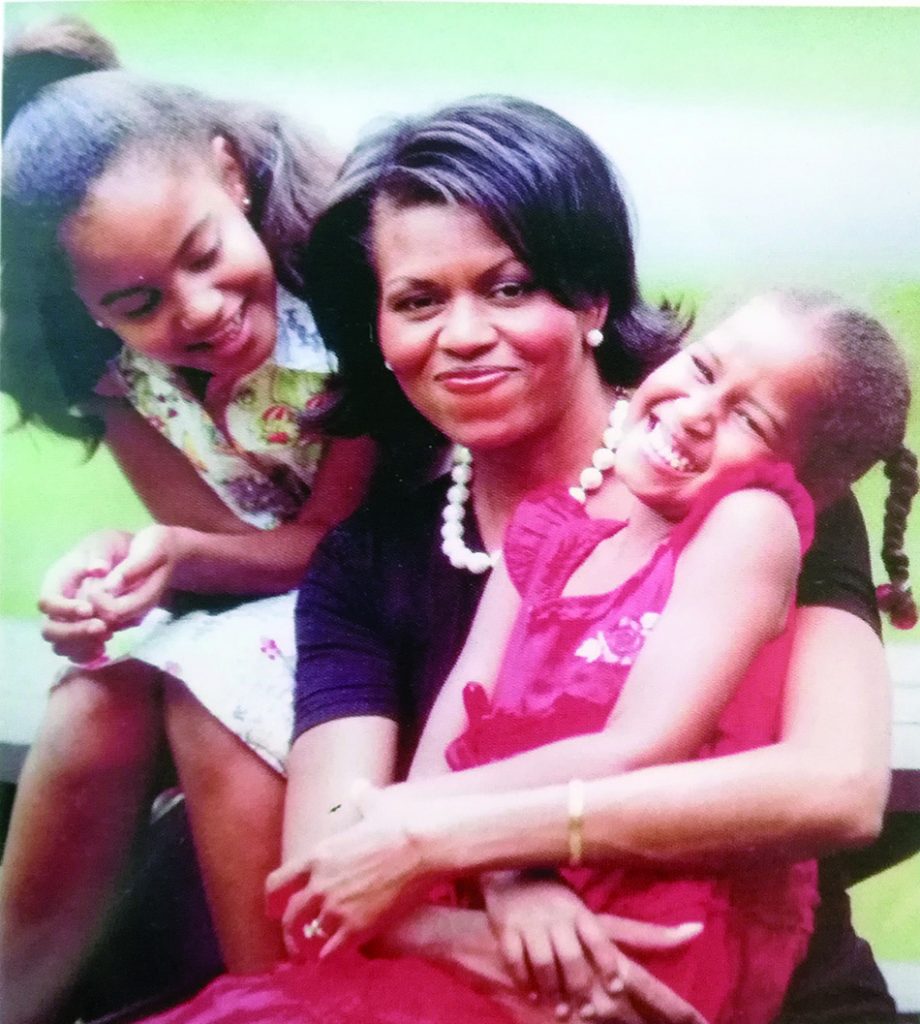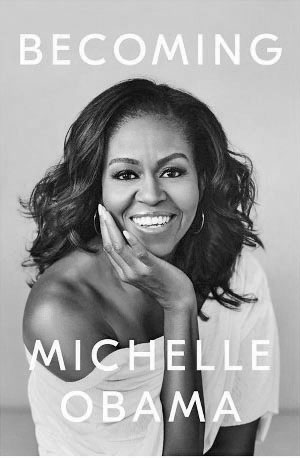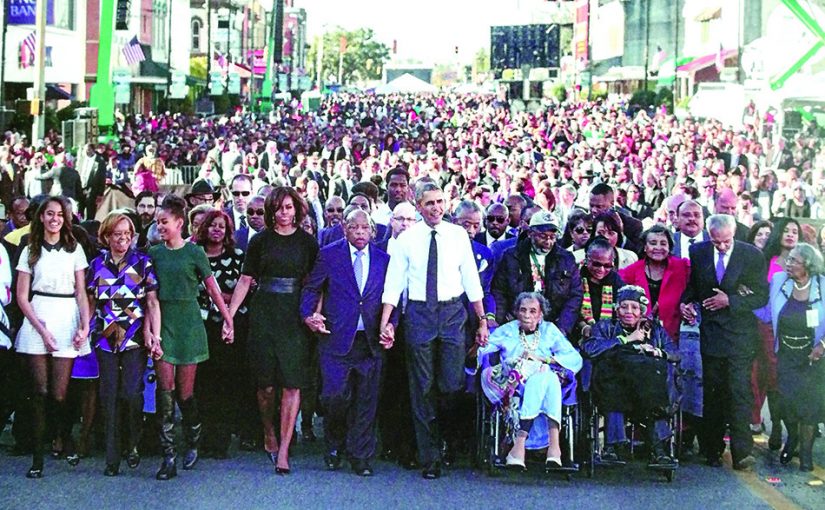In 2015, Michelle Obama’s family joined Congressman John Lewis and other icons of the civil rights movement in commemorating the fiftieth anniversary of the march across the Edmund Petrus Bridge in Selma, Alabama
Published by Viking, an imprint of Penguin Books, hardcover, British pounds 25 but available in India at 30% discount and more!
THIS is a book for our times. Becoming’ by Michelle Obama. Our politicians and their wives must read it, including Prime Minister Narendra Modi and Home Minister Shah! What a poignantly educative account Michelle Obama gives us of her life and times in the USA, presumably the most powerful country of them all in the world. Her story has relevance for us out here in India, aam aadmi and khaas aadmi both. It is a bit of a tome but “unputdownable” in the mind even if one may not be hurried into reading it from first to last page in one go, put it by your bedside and read chapter by chapter and then again in bits and pieces. Here is the story of the USA, most powerful nation on earth presumably, through the eyes of a well-educated modern woman born and bred in the America we perceive as black America (never mind that it is predominantly white and black Christian). Many of us in India may or may not be aware of what kind of a fine heady achievement it must have been when the people of the USA voted their first black president. It must have surely been a moment of arrival for black and white American society (the kind of wow moment we may feel if some day we see a Dalit or Muslim prime minister of India)! What’s more, President Barack Obama was president of the most powerful nation in the world for two terms running. What was it like to be in a position to wave a magic wand for a better tomorrow for all cutting across all troublesome, irksome, lunatic, racist, coloured, obsolete mindsets? Nobody better to ask than Michelle Obama and it’s all there in her comprehensive account inBecoming’ where she clues as well as illuminates us about what life is all about for African Americans coming from a black historical and cultural context steeped in the slave history of the USA.

Her book, written post-eight years as wife and First Lady while Barrack Obama was president of USA, is the first challenge she undertook once the years in the White House were over with a change of power. Mercifully, nobody stays in the White House forever at least so far in American democracy!
Becoming’ is an eye-opener of the very best kind for the rest of the world. After all West or East, how many women may walk hand in hand with their husbands in positions of power to help create situations to make the world a happier place — especially for the not so privileged and not coloured white people, but encompassing all colours? There is something called the politics of colour, features, languages and even in the way English is spoken by white Americans but not black Americans. The book makes one think hey, white nations have controlled the history of the world so long. It’s high time for non-whites to make amends for all the ills of humankind, exploitation for colonial-time economic gains, tyranny of racist prejudice (so deep-rooted and manifested in subtle and brutal ways, much like India’s caste system). Say to make amends for the real life chilling stories of racism in the countries of the West…can we do it with or without the white nations (remember a lot of whites are with us or are they)? The ever positive Barrack Obama would always said yes, if the will is there we can do it be it in or out of America! And overcoming all her initial negative fears so does Michelle Obama in her riveting, fascinating, sensitive and conscientiously detailedBecoming.’ Clearly, what we are becoming as human beings, be it west or middle east or east or far east, is an important question to address and redress in good, bad or ugly contexts.
Ever since iconic and much loved (much hated?) President Abraham Lincoln decided to liberate black slaves in the old USA — people caught like animals from the African continent and put to work as bonded slaves in early, pioneering American history — it’s been a long, long road to equal education, employment and human rights for the people from black Africa or black America which is part and parcel, or warp and weft of modern-day American history and civilization today.

Call them African Americans as Michelle Obama calls herself and she has experienced how growing up in the historic post-civil war years up to modern times was not easy for a long, long time. She writes of so many things to wrench our heart and soul as she opens the traumatic wounds of her grandparents generation, the hurts of her parents’ generation and her generation (she grew up as a little girl on what is called the South Side of Chicago where her parents Fraser and Marian Robinson raised her and brother Craig to be outspoken and unafraid of whatever life threw at them)…and finally how to equip her children to take on life’s challenges in a democratic spirit, respect and reverence for what are evergreen values.
Michelle worked hard to be a Princeton scholar (despite some whites telling her she was not the stuff of Princeton scholars) and found herself the only black woman and later on in a glassy office tower where she worked as high-powered corporate lawyer — she met one morning a law student named Barack Obama and he won her carefully kept in protective wraps heart!
I love the time she realizes she is not cut out for a successful corporate law career and upon confessing to her mother how frustrated, unfulfilled she felt, her practical mother tells to “make the money first and worry about your happiness later.” Though Michelle shared common dilemmas and dreams with her husband she suffers terrible anxiety moments as he campaigned to be a state senator first and thereafter to be president of the USA.
Keenly aware of how her grandparents made sacrifices and paid an emotional price for educating her parents, her parents too lived frugal lifestyles for her and her brother — Michelle Obama recounts how hers was a privileged black generation with a conservative background…there was always this poignant competition to be successful — to be good enough — as white people. However, if a black woman spoke educated English like the white people she was in trouble, if she didn’t, she was also in trouble.
Whoever said living up to higher ideals is easy? Michelle tells us while campaigning for her husband for the presidential elections she would be open, frank and honest…but there was always some media person who would maliciously twist what she said out of context and present her as yet another angry black woman living in hate most of the time and unfit to be First Lady.
All this regardless, Michelle Robinson Obama, a graduate of Princeton University and Harvard Law School, married a remarkable man and lived as First Lady of United States from 2009 to 2017. As First Lady she was gutsy enough to stand up to all the security fears and get engaged in educative and welfare campaigns of her own, like her most famous ‘Let’s Move’ campaign for better eating habits for American children eating and drinking too much junk and becoming obese, a health hazard at such a young age. She took on a mega powerful food industry, appealing to them for better sensibility — for the sake of better health for children. Despite initial discouragement she stood her ground and got an organic vegetable garden thriving and prospering out on the lawns of the White House as a case study of the very best kind.
All this and much more she has recounted with fine detailing in her book, with a lot of wisdom stirred in and to learn from. Currently, the Obamas live normally powered lives in Washington DC with their two daughters Malia and Sasha grown up into young adults. Not surprisingly `Becoming’ is one of the recommended books of the Oprah Winfrey Book Club and frankly I would prescribe it as contemporary literature of the very best kind to read in college syllabus in India.
So that we understand America (seeing how much in common we do have) and also India better! So that we too ask the question Michelle Obama asks: Who are we and who do we want to become?
— Reviewed by Pankajbala R Patel
Excerpted from ‘Becoming’ by Michelle Obama….

IT WAS I who made the appointment for my father to see a doctor, but it was my mother who ultimately got him there — by ambulance, as it turned out. His feet had ballooned and grown tender to the point that he finally admitted that walking on them felt like walking on needles. When it was time to go, he couldn’t stand on them at all. I was at work that day, but my mother described it to me later — Dad being carried out of the house by burly paramedics, trying to joke with them as they went.
He was taken directly to the hospital at the University of Chicago. What followed was a string of lost days spent in the purgatory of blood draws, pulse checks, untouched meal trays, and squads of doctors making rounds. All the while, my father continued to swell. His face puffed up, his neck got thicker, his voice grew weak. Cushing’s syndrome was the official diagnosis, possibly related to his MS and possibly not. Either way, we were well past the point of any sort of stopgap treatment. His endocrine system was now going fully haywire. A scan showed that he had a growth in his throat that had become so enlarged he was practically choking on it.
“I don’t know I missed that,” my father said to the doctor, sounding genuinely perplexed, as if he hadn’t felt a single symptom leading up to this point, as if he hadn’t spent weeks and months, if not years, ignoring his pain.
We cycled through hospital visits to be with him — my mom, Craig, Janis, and me. We came and went over days as the doctors blasted him with medicine, as tubes were added and machines were hooked up. We tried to grasp what the specialists were telling us but could make little sense of it. We rearranged my dad’s pillow and talked uselessly about college basketball and the weather outside, knowing that he was listening, though it exhausted him now to speak. We were a family of planners, but now everything seemed unplanned. Slowly, my father was sinking away from us, enveloped by some invisible sea. We called him back with old memories, seeing how they put a little brightness in his eyes. Remember the Deuce and a Quarter and how we used to roll around in that giant backseat on our summer outings to the drive-in? Remember the boxing gloves you gave us, and the swimming pool at Dukes Happy Holiday Resort? What about how you used to build the props for Robbie’s Operetta Workshop? What about dinners at Dandy’s house? Remember when Mom made us fried shrimp on New Year’s Eve?
One evening I stopped by and found my father alone, my mother having gone home for the night, the nurses clustered outside their hallway station. The room was quiet. The whole floor of the hospital was quiet. It was the first week of March, the winter snow having just melted, leaving the city in what felt like a perpetual state of dampness. My dad had been in the hospital about ten days then. He was fifty-five years old, but he looked like an old man, with yellowed eyes and arms too heavy to move. He was awake but unable to speak, whether due to the swelling or due to emotion, I’ll never know.
I sat in a chair next to his bed and watched him labouring to breathe. When I put my hand in his, he gave a comforting squeeze. We looked at each other silently. There was too much to say, and at the same time it felt as if we’d said everything. What was left was only one truth. We were reaching the end. He would not recover. He was going to miss the whole rest of my life. I was losing his steadiness, his comfort, his everyday joy. I felt tears spilling down my cheeks.
Keeping his gaze on me, my father lifted the back of my hand to his lips and kissed it again and again and again. It was his way of saying, Hush now, don’t cry. He was expressing sorrow and urgency, but also something calmer and deeper, a message he wanted to make clear. With those kisses, he was saying that he loved me with his whole heart, that he was proud of the woman I’d become. He was saying that he knew he should have gone to the doctor a lot sooner. He was asking for forgiveness. He was saying good-bye.
I stayed with him until he fell asleep that night, leaving the hospital in icy darkness and driving back home to Euclid Avenue, where my mother had already turned off the lights. We were alone in the house now, just me and my mom and whatever future we were now meant to have. Because by the time the sun came up, he’d be gone. My father — Fraser Robinson III — had a heart attack and passed away that night, having given us absolutely everything.
